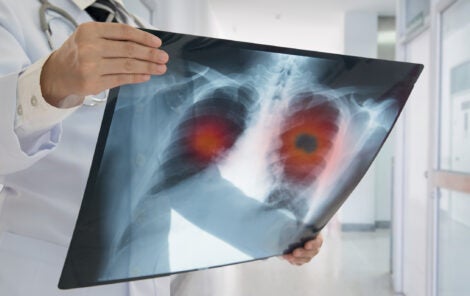For immediate release: May 5, 2023
Boston, MA—Quitting smoking early was associated with higher survival rates following a lung cancer diagnosis, according to a new study led by researchers at Harvard T.H. Chan School of Public Health. Compared to those who never smoked and were being treated for non-small cell lung cancer (NSCLC), current smokers had 68% higher mortality and former smokers had 26% higher mortality.
“Our participants’ smoking histories varied, with some having stopped smoking a few years before their diagnosis and others having stopped several decades before,” said senior author David Christiani, Elkan Blout Professor of Environmental Genetics. “This wide range gave us confidence in our results—that the benefit of pre-diagnosis smoking cessation persists even after lung cancer is diagnosed.”
The study was published online in JAMA Network Open on May 5, 2023.
While most similar research has compared mortality among current smokers and never smokers, the majority of the study’s participants were former smokers, allowing the researchers to focus on the impacts of smoking cessation.
The study followed 5,594 patients with NSCLC—which accounts for 85% of all lung cancer cases—enrolled in the Boston Lung Cancer Survival Cohort at Massachusetts General Hospital between 1992 and 2022. Of these participants, 795 had never smoked; 3,308 were former smokers; and 1,491 were current smokers. Participants completed questionnaires about their smoking habits and other health and demographic information at baseline, with the researchers checking in on their survival every 12 to 18 months. During the study period, 3,842 of the participants died: 79.3% of the current smokers, 66.8% of the former smokers, and 59.6% of the never smokers.
While never smoking was associated with the best odds of survival after a lung cancer diagnosis, the findings showed significant associations between lower mortality and having quit smoking pre-diagnosis. The longer a patient went without smoking, the more health benefits they accrued: For former smokers, doubling the years of smoking cessation before their lung cancer diagnosis was significantly associated with prolonged survival. Conversely, doubling smoking-pack years was associated with shorter survival among current and former smokers diagnosed with NSCLC.
The researchers noted that associations between survival and smoking history may vary depending on the clinical stage at which lung cancer was diagnosed, and that the study did not account for the different kinds of treatment participants were receiving.
Other Harvard Chan School co-authors included Xinan Wang, Christopher Romero-Gutierrez, and Jui Kothari.
Funding for the study came from National Cancer Institute grant 5U01CA209414.
“Prediagnosis smoking cessation and overall survival among patients with non-small cell lung cancer,” Xinan Wang, Christopher W. Romero-Guttierez, Jui Kothari, Andrea Shafer, Yi Li, David C. Christiani, JAMA Network Open, online May 5, 2023, doi: 10.1001/jamanetworkopen.2023.11966
Visit the Harvard Chan School website for the latest news, press releases, and multimedia offerings.
photo: iStock/utah778
For more information:
Maya Brownstein
mbrownstein@hsph.harvard.edu
###
Harvard T.H. Chan School of Public Health brings together dedicated experts from many disciplines to educate new generations of global health leaders and produce powerful ideas that improve the lives and health of people everywhere. As a community of leading scientists, educators, and students, we work together to take innovative ideas from the laboratory to people’s lives—not only making scientific breakthroughs, but also working to change individual behaviors, public policies, and health care practices. Each year, more than 400 faculty members at Harvard Chan School teach 1,000-plus full-time students from around the world and train thousands more through online and executive education courses. Founded in 1913 as the Harvard-MIT School of Health Officers, the School is recognized as America’s oldest professional training program in public health.
